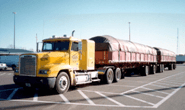Logistics

May 13, 2021
ATA CEO Implores Senators to “Do Their Job”
Written by Sandy Williams
American Trucking Associations President and CEO Chris Spear gave a blunt and passionate testimony to the Senate Commerce, Science & Transportation Committee on May 11, calling for bipartisan support for infrastructure legislation.
“Infrastructure is NOT partisan. If anyone in Congress believes that roads and bridges are political, you haven’t been driving on them. But they are in desperate need of your leadership and support,” said Spear.
Trucking employs 7.8 million Americans, accounting for one of every 16 jobs in the U.S. The industry moves more than 71% of the nation’s freight totaling $10.4 trillion worth of goods annually, said Spear.
“And despite a chronic and growing shortage of drivers, our industry and our intermodal partners here today are the glue that has kept this economy together these last 14 months.
“In fact, no pandemic, hurricane, flood, fire… no tariff, no tweet, or senseless partisan bickering is going to keep our industry from doing its job. But we are here today to ask that you do yours. Investments in our supply chain are desperately needed, including the roads and bridges that connect our ports, rail yards, and airports to the National Highway System,” said Spear.
“And understand that if these investments are indeed made, you have the opportunity to go home before your constituents and point and say… that road… that bridge… that railroad, port, waterway, airport… I did that. I helped make that happen.”
“In other words, stop blaming each other for the things you don’t do and start taking credit for the things you should do. These investments are long overdue,” said Spear. “They are the things Americans – your constituents – need, use and rely on every single day. They’ll be grateful.”






